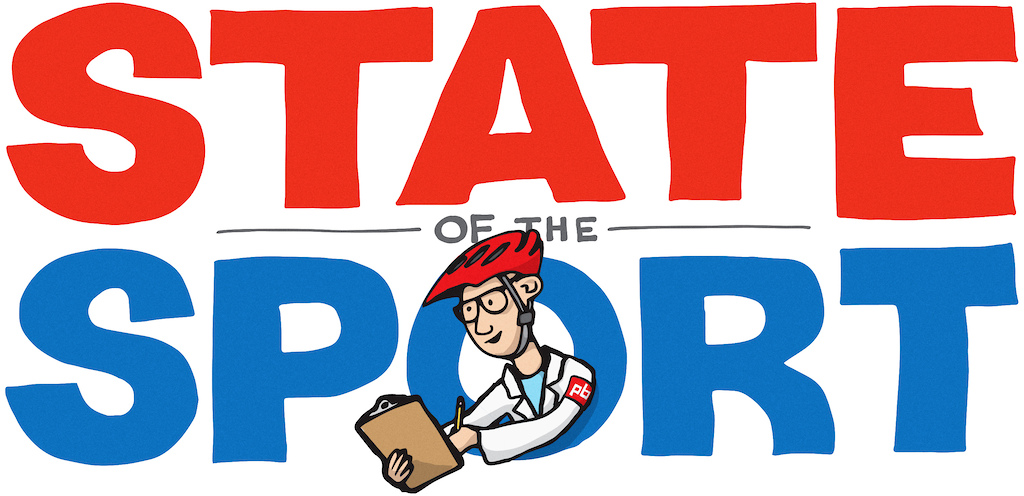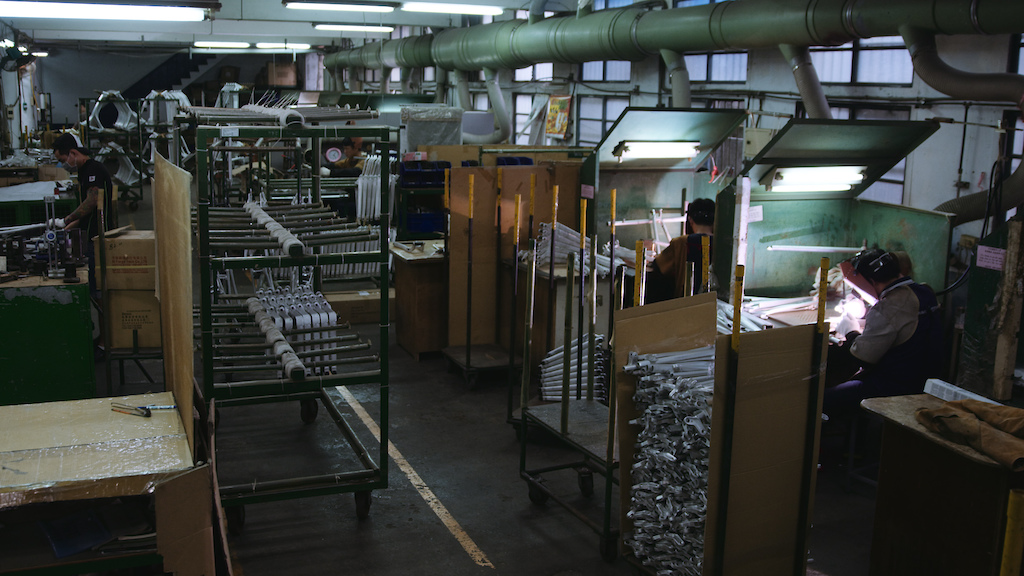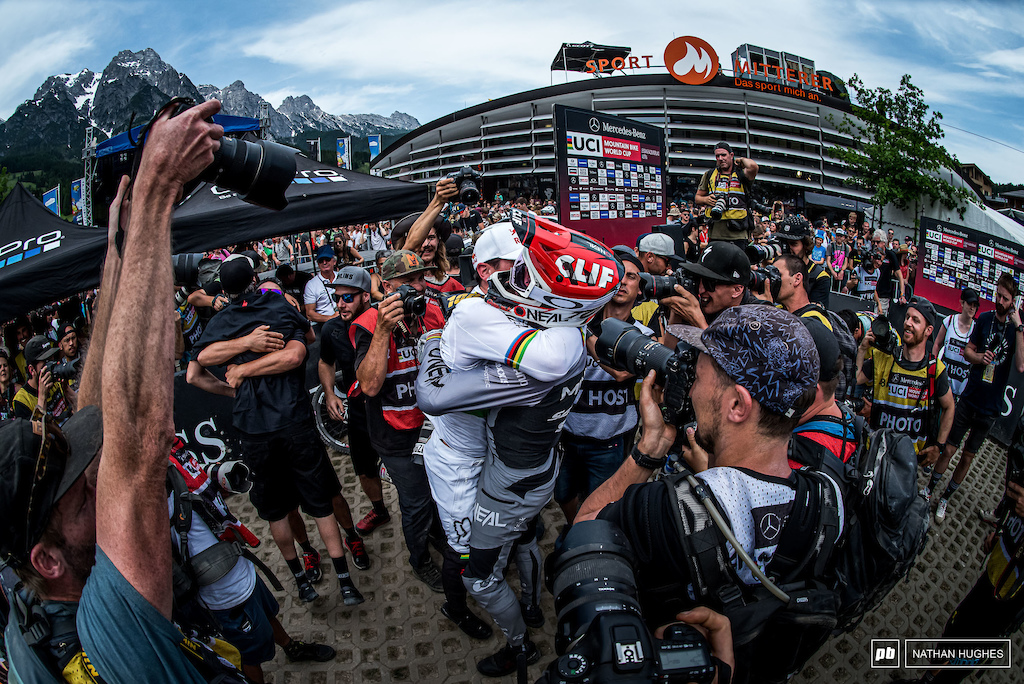4 Pieces of Good News From the State of the Sport Survey
Welcome to the 2021 Pinkbike State of the Sport Survey. This anonymous survey is designed to help shed light on key issues affecting the professional field and elite competition. We surveyed the best riders in the world to hear their thoughts, ideas, concerns, and criticisms on mountain biking in 2021. We invited any rider who had finished in the Top 40 overall of their chosen discipline in either of the previous two seasons in either XC, enduro, downhill, or slopestyle & freeride, as well as notable non-competition riders and highly ranked juniors. We then published them in full and publicly. To read the introduction to the survey click here, and to see all the other currently published SOTS articles click here.
This survey has shone a spotlight on the sport of mountain biking and so far most of what we've published has erred on the negative side of things (depending on your opinion on skinsuits anyway!). Mountain bike racing is something we love here at Pinkbike and rather than solely dwell on the downsides of the results, we also wanted to shed some light on the positive results from the Survey too.
An overwhelming majority of people involved in the sport do it because they love it and want to make it as great as possible. We didn't want this series to be an excuse to bash the industry and, on the whole, we think they do a great job at running the sport. It seems that the riders generally agree with us too. Here are four pieces of good news from the Survey that prove just that:
Riders felt safe competing during COVID-19
The big talking point of the 2020 season was the impact of COVID. Thankfully it didn't stop competitive riding completely and there were still events across the spectrum from downhill to slopestyle to XC to enduro. Event weekends were definitely unusual with constant testing and a noticeable lack of spectators but the UCI's protocols seem to have been effective and riders generally felt safe during the events.
Riders generally don't want more regulated bikes
One of the most exciting things about racing mountain bikes is the constant march of technological innovations. In the past few years of downhill alone, we've seen the introduction of mullet setups and the resurgence of high pivot designs all trickle down from the race track to consumer bikes. The same is also true in enduro where the bikes that most of us ride come directly from the EWS race circuit and there's no disputing how much better they have become since the Series' inception in 2013.
While greater uniformity for bikes might level the playing field for racers, it would very likely stifle this technological progression - something that has definitely become an issue in the hyper-regulated world of road cycling. Riders probably understand that a big part of their job is prototyping and testing new gear so it's no surprise that most of them want to be able to continue to do that in the future.
To test that hypothesis, we asked riders to respond to the statement, "I think bikes should be more regulated". In downhill, only 19% of riders wanted more regulated bikes, in enduro it was 8.7% and in cross country it was 30.5%.
Riders don't believe mechanical doping is an issue for any discipline
While mechanical doping, which is using a hidden motor in the downtube of the bike, has made headlines in the road cycling world in recent years, it doesn't seem to be a worry in any discipline of off-road cycling. At the eMTB World Championships last year, 3 Hungarian riders were removed from the startlist because the EPowers bikes they were using failed UCI checks but this seems to have been more confusion about the regulations rather than a malicious act.
We asked riders whether mechanical doping was an issue in their discipline and only 4.3% of enduro racers, 6% of downhill racers and 11.1% of cross country racers thought it was.
Riders believe competition is, in general, fair, and honest
Perhaps the best news from the Survey is that riders generally believe they are competing on a level playing field. Yes, this Survey may have presented some issues that are part of the current fabric of the sport but on the whole, racers don't think they disrupt the fairness of competition.
We asked racers to respond to the statement, "The racing is, in general, fair and honest" and in cross country, 75% of racers agreed to some extent with the statement, in downhill it was 88% and in enduro it was 80%.
The discipline where trust in the fairness of competition is lowest is slopestyle. 50% of riders agreed to some extent with the statement but the remaining half either answered neutrally or disagreed. We speculate that the subjective, judged nature of slopestyle competition leads to riders believing it isn't as fair as other disciplines.
This survey has shone a spotlight on the sport of mountain biking and so far most of what we've published has erred on the negative side of things (depending on your opinion on skinsuits anyway!). Mountain bike racing is something we love here at Pinkbike and rather than solely dwell on the downsides of the results, we also wanted to shed some light on the positive results from the Survey too.
An overwhelming majority of people involved in the sport do it because they love it and want to make it as great as possible. We didn't want this series to be an excuse to bash the industry and, on the whole, we think they do a great job at running the sport. It seems that the riders generally agree with us too. Here are four pieces of good news from the Survey that prove just that:
Riders felt safe competing during COVID-19
The big talking point of the 2020 season was the impact of COVID. Thankfully it didn't stop competitive riding completely and there were still events across the spectrum from downhill to slopestyle to XC to enduro. Event weekends were definitely unusual with constant testing and a noticeable lack of spectators but the UCI's protocols seem to have been effective and riders generally felt safe during the events.
In total 56.4% of riders agreed to some extent with the statement "I felt safe racing or competing during the COVID-19 pandemic" with 14.3% disagreeing to some extent,18.5% answering neutrally and a further 10.8% not racing during the pandemic.
Downhill and enduro racers felt the safest with around 67% of riders in both disciplines agreeing to some extent to the statement. Just under 50% of riders in slopestyle and cross country agreed with the statement but with a proportion of riders in both disciplines also answering neutrally, it's safe to assume riders, on the whole, felt comfortable competing in both disciplines.
Downhill and enduro racers felt the safest with around 67% of riders in both disciplines agreeing to some extent to the statement. Just under 50% of riders in slopestyle and cross country agreed with the statement but with a proportion of riders in both disciplines also answering neutrally, it's safe to assume riders, on the whole, felt comfortable competing in both disciplines.
I felt safe racing or competing during the COVID-19 pandemic
Strongly Agree: 27 (13.8%)
Agree: 83 (42.6%)
Neutral: 36 (18.5%)
Disagree: 19 (9.7%)
Strongly Disagree: 9 (4.6%)
I did not race or compete during the Covid-19 pandemic 21 (10.8%)
Strongly Agree: 27 (13.8%)
Agree: 83 (42.6%)
Neutral: 36 (18.5%)
Disagree: 19 (9.7%)
Strongly Disagree: 9 (4.6%)
I did not race or compete during the Covid-19 pandemic 21 (10.8%)
Riders generally don't want more regulated bikes
One of the most exciting things about racing mountain bikes is the constant march of technological innovations. In the past few years of downhill alone, we've seen the introduction of mullet setups and the resurgence of high pivot designs all trickle down from the race track to consumer bikes. The same is also true in enduro where the bikes that most of us ride come directly from the EWS race circuit and there's no disputing how much better they have become since the Series' inception in 2013.
While greater uniformity for bikes might level the playing field for racers, it would very likely stifle this technological progression - something that has definitely become an issue in the hyper-regulated world of road cycling. Riders probably understand that a big part of their job is prototyping and testing new gear so it's no surprise that most of them want to be able to continue to do that in the future.
To test that hypothesis, we asked riders to respond to the statement, "I think bikes should be more regulated". In downhill, only 19% of riders wanted more regulated bikes, in enduro it was 8.7% and in cross country it was 30.5%.
Riders don't believe mechanical doping is an issue for any discipline
While mechanical doping, which is using a hidden motor in the downtube of the bike, has made headlines in the road cycling world in recent years, it doesn't seem to be a worry in any discipline of off-road cycling. At the eMTB World Championships last year, 3 Hungarian riders were removed from the startlist because the EPowers bikes they were using failed UCI checks but this seems to have been more confusion about the regulations rather than a malicious act.
We asked riders whether mechanical doping was an issue in their discipline and only 4.3% of enduro racers, 6% of downhill racers and 11.1% of cross country racers thought it was.
Riders believe competition is, in general, fair, and honest
Perhaps the best news from the Survey is that riders generally believe they are competing on a level playing field. Yes, this Survey may have presented some issues that are part of the current fabric of the sport but on the whole, racers don't think they disrupt the fairness of competition.
We asked racers to respond to the statement, "The racing is, in general, fair and honest" and in cross country, 75% of racers agreed to some extent with the statement, in downhill it was 88% and in enduro it was 80%.
The discipline where trust in the fairness of competition is lowest is slopestyle. 50% of riders agreed to some extent with the statement but the remaining half either answered neutrally or disagreed. We speculate that the subjective, judged nature of slopestyle competition leads to riders believing it isn't as fair as other disciplines.
Author Info:
Must Read This Week
How to Watch the 2024 Mountain Bike World Cup [Update: Staylive Offering Access in New Zealand, South Africa & More]
59348 views
59348 views
Sign Up for the Pinkbike Newsletter - All the Biggest, Most Interesting Stories in your Inbox
PB Newsletter Signup






Happy Birthday Homer!
Sure, they use skintight body suits in competitive wrestling but then Again, no quick motions!
I wore tight stuff for XC, and yes there are pockets in the jerseys, but have done drops and jumps with that stuff being filled? I'd like to claim that you didn't. Because that stuff hits your lower back like the chad that slaps your ass when you bent over. All the tools, phone, snacks... You feel it dragging you down.
Why no skinsuit in DH?
It's tight, it's TIGHT. Now imagine being on a race where you hit a hard compression. The seams make it difficult to move, stretch or even engage into things. It's like squaring with tight jeans. It doesn't support and restrains you!
Maybe not Floyd or Tyler
While this doesn't technically qualify as doping in a traditional sense, it does make the playing field uneven from some people's perspectives. Being able to focus on the race and just the race makes a big difference to some.
I don't think they are referring to hidden engines but I may be wrong?
Perhaps 11% of riders think it's an issue worth monitoring and taking measure against, so that it doesn't happen in future.
The question wasn't worded in such a way as to determine what 'issue' really means.
This is the actual question, taken from the other post sharing all the results. So it was a very specific question about use of hidden electric motors. The results:
Strongly Agree: 3 (8.3%)
Agree: 1 (2.8%)
Neutral: 19 (52.8%)
Disagree: 5 (13.9%)
Strongly Disagree: 8 (22.2%)
Road cycling is a completely different animal and without those "stifling" regulations we would see racers on recumbents with plastic fairings on any stage without steep climbs. They'd also ride completely unsafe bikes lighter than Dangerholm's wildest fantasies.
I wonder why MTB is different? Does the terrain limit innovations so regulations aren’t necessary? Or are we just more comfortable with crazy innovations than road? Or maybe we just feel that the sport is so hard to begin with that we’ll take anything that helps.
We could have add today's bikes 10 years ago if the people making decisions would have listened to engineers and learned more from motocross and other areas of motorsport.
I think there's also not enough money in mtb from outside the bike industry to give racers equipment that can't be sold to the public.
Even if someone shows up at a DH or EWS race on something like the Grim Donut, it's still fundamentally a bicycle as we know it.
Roadies would ride stuff not even resembling current bikes if the UCI let them. Imagine what they'd bring to time trials...
@c-radicallis: That's a fairly naive point of view. I'd say they're not incompetent at all and in fact listen to their engineers very, very closely. The reason they didn't make a big leap from 2011 geo to 2021 geo in a single year is IMHO purely commercial. What would they sell you year after year if they didn't make those incremental changes? New paintjobs? Or would they have to invest boatloads of money in innovating something other than geometry each year? How would that make financial sense when here they have something they had already spent the R&D budget on a long time ago and just have to implement in small doses? Do you really believe Kokkonen or Porter discovered some secret knowledge guys at big brands didn't have? No, they just took it to market faster to stand out because that's what small players do.
A whole other story is us, the consumers. I'll bet a 6-pack that a lot of brands are ready to push gearbox-equipped, Donut-geometry, dual-crown, 32"-wheeled trailbikes to the market any day of the week. It's just that almost no-one will buy them. For all the whinging on PB about gearboxes, if you were an outsider looking in you'd think such bikes aren't being made today. But they are, quite a few brands and models. Are they flying off the shelves then? Not really. Are trails flooded with Poles and Geometrons? Nope. In fact Pole have reined their sizing in a bit while others caught up with the incremental changes and now a Stamina 180 and a Meta AM 29 have pretty much the same geometry. It'll stay there for a while because in reality people won't spend their hard earned dollars on the Grim Donut. Can we not buy dual crown "enduro" forks or is the Boxxer not light enough? We can and it is, but en masse we simply don't want them. We are the main reason the Zeb and 38 exist instead. And so on and so forth.
Do the ones who get good results think it's unfair?
Larger wheels are faster, but small people can't maneuver large wheeled bikes properly, as is clear by all the tire marks on pants (even Bruni who is something like 5'11'' hits his ass all the time).
Going to smaller rear wheels would:
- Allow everyone to run their prefered bike geometry
- Increase possibilities for shock, linkage and pivot placement (and consequently water bottle placement for enduro and bikepark bikes)
- Allow smaller riders to handle the bikes properly and be competitive with taller riders.
If there is no resctriction on wheel size manufacturers will be producing even larger wheels in the near future, which obviously will make for faster bikes, but will surely make for less entertaining racing.
I think a more competitive sport is more interesting. Maybe some people who think otherwise and can explain to me why.